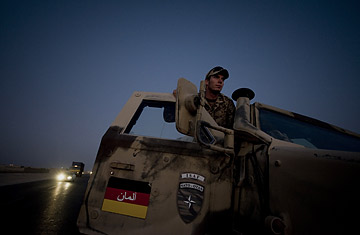
German soldiers partol in Mazar-i-Sharif as part of the NATO security force.
In spite of crumbling public support for the mission in Afghanistan, the U.S.'s NATO allies should be able to muster an extra 5,000 troops to join President Barack Obama's surge, officials at the alliance say. But this will still fall well short of the 10,000 troops Washington has been seeking. And it is likely to come with demands for a more robust strategy to build civil institutions, including benchmarks on stamping out fraud and corruption in the Afghan government.
In his speech announcing a surge of 30,000 U.S. troops Tuesday, Obama's made it clear that he expects more help from his allies, insisting that extra NATO troops was a test of the alliance's credibility. In turn, NATO Secretary-General Anders Fogh Rasmussen, said he was confident 5,000 extra troops could be found. "This is not a U.S. mission alone: America's allies in NATO have shared the risks, costs and burdens of this mission from the beginning," said Rasmussen, who has traveled around Europe in recent weeks to drum up more military muscle.
Some NATO officials, though, say that even getting to 5,000 extra troops could be hopeful. That number may include troops that were already deployed as reinforcements for Afghanistan's presidential elections last August. And many NATO countries, struggling with a deeply skeptical public, have already indicated they want to scale back their military involvement in Afghanistan.
So far, only Britain has come up with a plan to send extra troops — about 500 — while the other major European powers, notably Germany and France, are reluctant to commit any. Surveys consistently show that most European voters feel the Afghan mission is failing and are opposed to any additional deployments. In Britain, around 70% of the public favors an early withdrawal. The global economic crisis is also setting new budgetary constraints on government expenditure. "I don't see anyone sending massive numbers. Most countries are under pressure to announce exit strategies," says Shada Islam, Senior Program Executive at the European Policy Center, a Brussels-based think tank. "It's such a confused narrative about what we are doing in Afghanistan. Nobody can explain what we're doing, and people think there is nothing to show for the billions of dollars plowed into this."
There are currently more than 110,000 foreign soldiers in Afghanistan, anchored by a 68,000-strong U.S. force. The other members of the 43-nation, NATO-led coalition provide some 42,000 troops. The Afghan army currently numbers about 94,000, but the government wants a force of 134,000 by October 2010, rising to 232,000 by 2013.
Besides the extra troops from the U.K., Italy, Georgia, Montenegro, South Korea and Turkey, have said they are ready to send more troops — though none have indicated numbers. Poland, Spain and Slovakia are thought to be considering reinforcements, along with non-European allies like New Zealand and Japan. But the Netherlands has already announced it is pulling out its 2,160 troops next year, and Canada will withdraw its 2,800-strong force by the end of 2011.
French President Nicolas Sarkozy welcomed Obama's speech, calling it "courageous." But Sarkozy has already pledged that he "won't send an additional soldier" to bolster the nearly 3,750-strong French contingent. (NATO officials hope he may send more military or police trainers.)
German Chancellor Angela Merkel is thought to be mulling reinforcements to Germany's current deployment of 4,365, but she will wait until after an international conference on Afghanistan, set for late January in London, before announcing more resources. "The timeline is diminishing. European support will last for a year, maybe two," says Greg Austin, vice president of program development and rapid response at the EastWest Institute. "But in the long term, it is not sustainable for the U.S. and its NATO allies to bear the burden. There has to be a more hard-nosed diplomacy to mobilize neighboring countries. Countries like India and Pakistan will be able to better provide police training in Afghanistan than Denmark."
Europe has also been vocal in its frustrations over rebuilding efforts in Afghanistan. A report prepared for E.U. governments in October said the current nation-building efforts have been too slow, with political reform and clean government almost nonexistent in spite of eight years of U.S. and European assistance. "The situation in Afghanistan is deteriorating," the report said.
Even the E.U.'s reconstruction efforts have fallen short. Europe has committed $12 billion in aid to Afghanistan over the past eight years to help projects like rural development, governance, health, mine removal and human rights. But it is still struggling to deliver the 400 police trainers it committed to deliver years ago. "More troops are not the solution. The highest priority is not military, but civil development," says Thijs Berman, a Dutch member in the European Parliament and head of its Afghanistan delegation. He says the best way the international community can help is to fight corruption and the resurgence of the opium trade. "Terrorism can only be fought with credible government, with developments the population believes in."
U.S. officials will get to hear European concerns over the next few days in a series of key meetings on Afghanistan. Hillary Clinton will be in Brussels to secure commitments from governments at a meeting of Foreign Ministers on Thursday and Friday. Richard Holbrooke, U.S. Special Representative for Afghanistan and Pakistan was in Brussels Wednesday to meet key E.U. officials. And military officers will also meet in the southern Belgian town of Mons on Dec. 7 to discuss the mission's resources. They should all lower expectations about how much Europe is willing to contribute.
